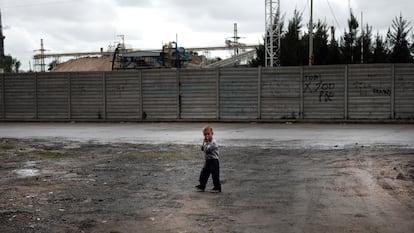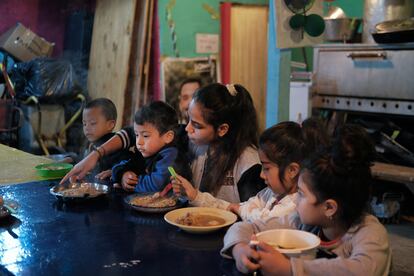Child poverty in Argentina will grow from 57% to 70% if conditions do not change, according to UNICEF
The United Nations agency projects that the budget for children will fall 75% in real terms in 2024

The United Nations Children’s Fund, UNICEF, predicts that child monetary poverty will grow in Argentina to 70.8% and that extreme poverty among children and teenagers will rise to 34.4% in the first quarter of the year if “general conditions do not change” in the country. “The inflationary levels of this period and economic stagnation result in a pronounced increase in poverty levels in all its forms, negatively impacting the well-being of girls and boys,” says one of the three reports presented by UNICEF this Tuesday. Experts also warn that the implementation of key policies for the development of minors in Argentina is showing “warning signs” in the first months of Javier Milei’s administration.
The reports presented by UNICEF indicate that, at the end of 2023, 57% of children and adolescents in Argentina were poor, that is, 7.1 million minors. Some of them were in situations of even greater vulnerability: “Poverty increases when the household members have a very low educational level of schooling (83%), in the cases of single-parent households (68%) or when they reside in popular neighborhoods (84%).” The studies also addressed non-monetary poverty, and spoke of deprivations of fundamental rights affecting seven out of 10 children — 8.6 million nationwide — by late 2023.
Since December, however, the economic crisis in Argentina has deepened even more due to the adjustment imposed by the Milei administration. The far-right populist president’s measures resulted in a fiscal surplus in January as a result of the sharp cuts in public spending, but poverty soared. In this context, this year’s budget, which is an extension of the 2023 budget, allocates 75% less money in real terms to policies aimed at children and adolescents, according to UNICEF.
The agency points out that this collapse is added to the contraction of 2023, the last year of Alberto Fernández’s leftist administration, when the budget for children was reduced by 17% in real terms compared to the previous year. UNICEF said it is “imperative” that the government expand these items “to prevent more boys and girls from falling into poverty.”
“The budget constitutes a key tool to provide elements from fiscal policy that guarantee compliance with the rights of children and adolescents,” said Luisa Brumana, UNICEF representative in Argentina, in a statement released after the presentation of the reports. During the event, held at the UNICEF offices in Buenos Aires, Brumana told journalists that UNICEF specialists have already met with “several teams” from different ministries of the current Cabinet and hope to soon have “tactical meetings” to “present working plans” to the government.

Programs with “zero” execution
The United Nations agency also warned about the “zero or near zero” levels of execution of a “significant number” of initiatives linked to the food, education and health of minors so far this year. But experts did not mention community kitchens, neighborhood spaces that provide additional meals to millions of struggling Argentines and which have stopped receiving supplies from the national government while the new administration reviews the model. UNICEF specialists noted that funding for these soup kitchens is not included in the budget allocations for children.
UNICEF also underscored the “high” levels of execution of other programs, such as the Alimentar card, which for the Milei government is the “most efficient” policy against hunger, or the Universal Child Allowance. The first is an instrument that the state gives to mothers or fathers with children under 14 years of age for the purchase of food, and which directly reaches 3.8 million people, according to official data. The second is a monthly sum that the state pays for each child under 18 years of age to unemployed parents, as well as those with informal jobs or who are employed in domestic service. According to the U.N. agency’s analysis, the execution of these programs is too high for this time of year because “the amounts provided in the budget are not sufficient” to provide coverage all year round.
UNICEF experts assure that the increases that the government established for these two programs at the beginning of the year “contributed to mitigating the impact of price increases” — inflation exceeded 276% year-on-year in February — but none are sufficient to cover the basic food basket nor has it managed to “reverse the situation.” “Although there were positive signs, it is key to maximize efforts to improve the coverage and adequacy of benefits,” said Sebastián Waisgrais, a specialist in Social Inclusion and Monitoring at UNICEF, in a statement released after the presentation of the reports.
This expert warned that without income transfer policies, the situation would be even more critical: “Around 270,000 more girls and boys would live in poverty and more than a million would become destitute.” “In a context of social vulnerability and high levels of child poverty, it is important to sustain budget allocations for household income protection policies,” urged Waisgrais. “Protecting investment in children and adolescents,” the reports warn, “is also a necessary condition to lay the foundations for sustainable social and economic development for Argentina.”
Sign up for our weekly newsletter to get more English-language news coverage from EL PAÍS USA Edition
Tu suscripción se está usando en otro dispositivo
¿Quieres añadir otro usuario a tu suscripción?
Si continúas leyendo en este dispositivo, no se podrá leer en el otro.
FlechaTu suscripción se está usando en otro dispositivo y solo puedes acceder a EL PAÍS desde un dispositivo a la vez.
Si quieres compartir tu cuenta, cambia tu suscripción a la modalidad Premium, así podrás añadir otro usuario. Cada uno accederá con su propia cuenta de email, lo que os permitirá personalizar vuestra experiencia en EL PAÍS.
¿Tienes una suscripción de empresa? Accede aquí para contratar más cuentas.
En el caso de no saber quién está usando tu cuenta, te recomendamos cambiar tu contraseña aquí.
Si decides continuar compartiendo tu cuenta, este mensaje se mostrará en tu dispositivo y en el de la otra persona que está usando tu cuenta de forma indefinida, afectando a tu experiencia de lectura. Puedes consultar aquí los términos y condiciones de la suscripción digital.








































